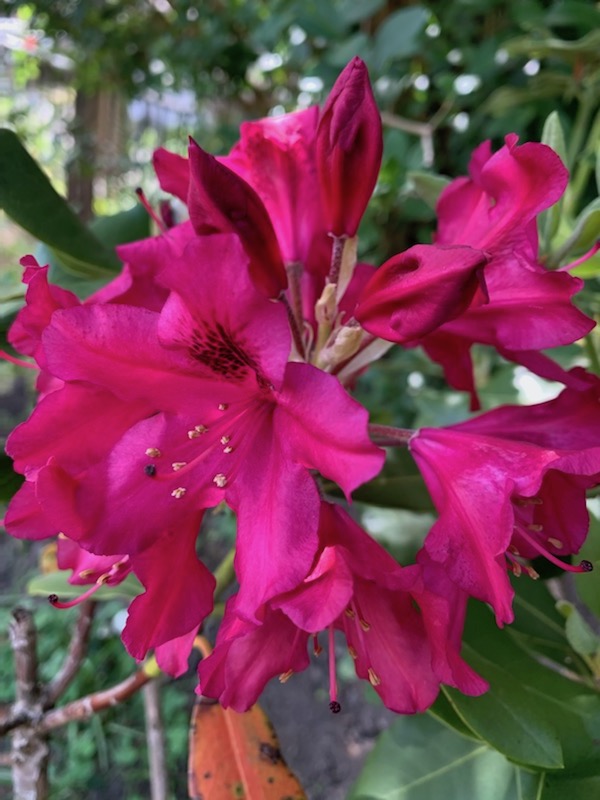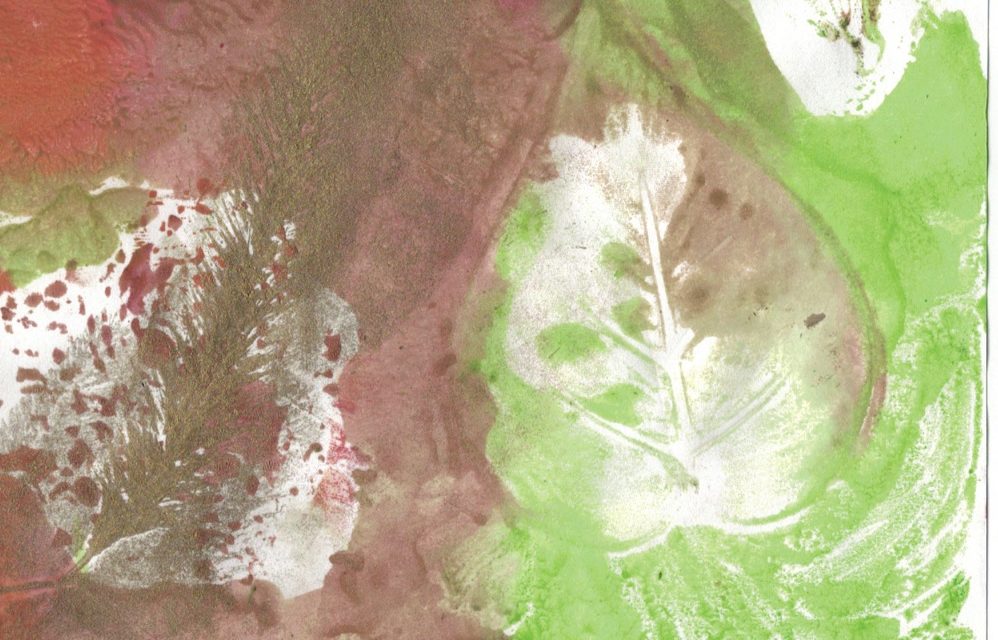A day or two later I am kneeling in the dirt, clawing at the earth while my insides bleed out. Handful after handful of mint rhizomes, roots that travel, roots that take over and pop their heads up meters away from where they started – I am pulling them out with a resoluteness that is healing. If we’re going to start over, to not grow a new life, to recalibrate for a summer of more energy than I expected to have, might as well start with shredding to pieces a beautiful, useful, horribly invasive plant. The landscaping will go on!
It is not really enough consolation; it is what I have for now.
My oldest child has rigged up what looks like a giant spider web: a thin nylon rope, several bungee cords, and a leather strap that he had me tie around a sizable chunk of landscaping rock. It stretches from the climbing tree across the chain link gate, effectively swinging the leather strapped rock at the midsection of anyone who unwittingly tries to access the gate from our parking space. That person was me with six bags of groceries earlier this week, seething with fury that three energetic males were in the house, playing “hiding” which means they bury themselves under the covers of a bed as soon as they hear the car arrive, and I struggle my way into the house with all the heavy food that I will begrudgingly cook for them all week long, and as soon as I get in the house but before I am able to put away anything that is melting I am immediately pelted with screams: Moooooooom! Come FIND us!! And I have to work my way up to a fun, “I wonder where they could be?!” mood as I shove the frozen items into the freezer and leave the milk sitting in the middle of the kitchen floor to go play “seeking” and pretend to have a good time.
As I move the grocery bags in from the car and feel a chunk of my insides give way, I am preparing the lecture I will give: this is the LAST week any able bodied males will leave me to struggle with the burdens that feed them. My delivery will be harsh, my tone irreconcilable. And then the two year old crashes down the stairs, mostly undressed, tired of hiding quietly, needing something from the bathroom, so I shove the ice cream I secretly bought for myself and only myself into a hidden place in the freezer and follow him up.
In the time it takes me to hide my stash, he has managed to twist his torso into the shower curtain and is giggling maniacally. And then I am instantly screaming, terrified, because the other two, the predictable quiet bedclothes hiders, have exploded from the tub shrieking “BWAHHHHHH!” We all have a crazy laugh. Another chunk of my insides crashes down. I calmly tell the boys that from now on they are coming to meet me at the car to carry in the heavy groceries. They seem to understand that a new season of life has begun.
I dig out a rhododendron, small and wimpy. The plant has covered itself with buds every year we’ve lived in our house and I have not once seen a flower. I post it online and a friend immediately claims it. It feels good to give up trying to save every damn thing: carnivorous houseplants, chickens, garden annuals, sourdough starter. They are all dying on my watch, dying with a steady, inexcusable slowness.
A neighbor headed out to his car asks how I am. I lean on the shovel: Oh you know I’m fine just digging out a rhododendron and having a miscarriage.
Not really. I say we are all well. Because we are. Even my father who has walked three miles around his hospital floor just hours after his abdominal surgery.
It feels so good to flop the bagged shrub with a resounding thump into the parking spot and shout crazily: “I am done with you!!”
Two other chicks appear to be infected with the wheezing and fatigue. We move them each to individual quarantine boxes. The dining room is now lined with pine shaving filled sick beds. Each box needs its own food, water, and heat source. We’re out of lamps and heating pads. We are waiting for the other three to catch it. I recognize that I am numbing out, going through the motions with my kids in the midst of dust and feathers and the loosing of large blood clumps from my own body.
My father turns 70 just days after his hospital release; my sister and I stand in our parents’ tiny yard and drink take-out frozen margaritas while he and my mom read birthday cards on the the porch. The little boys play in the sandbox and try to remember which family members they are allowed to touch.
A few days in, I take a bath. The first half is lovely. The second half is children hurling their bodies at the locked door and howling at the top of their lungs. My five year old rages louder than Sufjan can layer synthesizers. I float my head on an inflatable neck pillow underwater where, with submerged ears, I can just pretend not to hear him. Sorry, my husband says, when I emerge from the bathroom, wet and only slightly more relaxed than when I went in. I’m sorry too, for so many things. But I have made some sensory reconnection to my inner self through the water, and the music, and the warmth. The sound of waves in my ears swallowing up the outside world.
A miscarriage is a small, secret birth, unsatisfying and unyielding. Yet here is my body, knowing just what to do, going about its business of cleaning house and healing. I am aware of the silent power I possess: watch me rebuild the engine room of human regeneration. But you can’t watch – only my body and I can know.
In our order of seedlings from the local farm, the ones that mostly died as globs of frozen nightshades, is a river locust, Amorpha fruticosa. The river locust fixes nitrogen, a prized soil component, but not very simply. The plant must become infected by a common bacterium which causes it to grow nodules in its roots to store the readily available nitrogen in the air. But the soil nitrogen does not become available to other plants to use until the storage plant dies. So the river locust holds nitrogen in its body, and then its pruned branches, tilled into the soil, will decompose to feed everything around it. Life and death; holding and sharing: this plant will be the memorial to our lost child.
I take the bag of frozen remains out of the freezer and bury them under the river locust.
It will be several more weeks before we bury a tiny chicken, not the wheezing one but our other favorite, with a genetic deformity that prevents her growing body from eating. Part of me believes we could have saved her, if I had only realized and started tube feedings immediately. If I hadn’t been so distracted by, you know, the pandemic, the six tiny chicks, the miscarriage, the country in flames, protests and sit ins, my father’s emergency surgery. Let it go, I breathe in evening meditation on the night I realize she will die. Just let it go.
The next morning we prepare to bury Pingwing next to the hydrangeas which are exploding with white clusters of blooms. My son has carried her dead body all around the house, looking for a suitable shroud, aware of what we are about to do but not fully understanding. Support her neck, I remind him, we respect her body in death just as we did in life. Finally she is gently folded into a scrap of linen with blue lines. We scatter white and pink petals from our rose bushes, and twigs from my two year old’s sticky hands, on her cloth wrapped body deep in its hole. I ask the boys: What was your favorite thing about Pingwing? Because that is how, at death, we remember life.
A few weeks later I receive a text message, a photograph of a cluster of vibrant pink flowers. “Thank you for this beautiful blooming bush!!” writes my friend. The rhododendron, no longer my rhododendron, is thriving because: I let it go.


